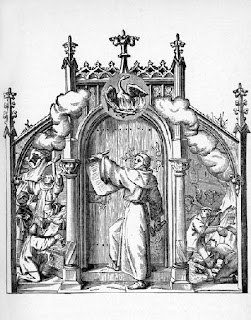Conclusion
(This is the final of my five part series)
- Part I An Introduction and Overview of the Renaissance
- Part II Political and Social Changes
- Part III Literature
- Part IV Art, Inventions, & Explorations
- Part V Conclusion
The definition of the word Renaissance is "rebirth" and while it is true that the era was highlighted by man's awakening from a spell of stagnation known as the Dark Ages, the Renaissance helped give men the will that was needed to stand up to the church. It seems quite interesting that, prior to the rebirth, we had so much death. This death ca me about from the great plague of 1348-49, along with the smaller more isolated ones to follow. These devastating plagues effected every aspect of society throughout Western Europe.
me about from the great plague of 1348-49, along with the smaller more isolated ones to follow. These devastating plagues effected every aspect of society throughout Western Europe.
So was all this devastation just a mere coincidence? Maybe, but throughout history great achievements have always followed a time of strife, destruction, and mass loss of life. One just has to look at the positive affect the destruction of Israel's Northern Kingdom, and the eventual dispersion, had on the fullness of time as the best example. The plagues that struck Europe throughout the thirteenth, fourteenth, and fifteenth centuries left men with a sense of their own mortality, and a feeling of destiny. This feeling gave them the will to stand up to the feudal lords when they were forced into working harder with no benefit or reward. Just as there were guild revolts in the cities in the late 1300s, so we find rebellions in the countryside. The Jacquerie in 1358, the Peasants' Revolt in England in 1381, the Catalonian Rebellion in 1395, and many revolts in Germany, all added to the feudal lords loosing there grip on the peasant class.
 me about from the great plague of 1348-49, along with the smaller more isolated ones to follow. These devastating plagues effected every aspect of society throughout Western Europe.
me about from the great plague of 1348-49, along with the smaller more isolated ones to follow. These devastating plagues effected every aspect of society throughout Western Europe.So was all this devastation just a mere coincidence? Maybe, but throughout history great achievements have always followed a time of strife, destruction, and mass loss of life. One just has to look at the positive affect the destruction of Israel's Northern Kingdom, and the eventual dispersion, had on the fullness of time as the best example. The plagues that struck Europe throughout the thirteenth, fourteenth, and fifteenth centuries left men with a sense of their own mortality, and a feeling of destiny. This feeling gave them the will to stand up to the feudal lords when they were forced into working harder with no benefit or reward. Just as there were guild revolts in the cities in the late 1300s, so we find rebellions in the countryside. The Jacquerie in 1358, the Peasants' Revolt in England in 1381, the Catalonian Rebellion in 1395, and many revolts in Germany, all added to the feudal lords loosing there grip on the peasant class.
To continue reading this article, please follow the link below ...........
Part V
Conclusion
"How the Renaissance Led
to the Reformation"
Part V
Conclusion
"How the Renaissance Led
to the Reformation"
I apologize for the inconvenience, but I am in the process of moving all my articles to a new site. I have been given my own blog with my hometown newspaper in Chico California, called the "Enterprise Record". My new site is called "Gate" which I will be referring to as the "ChicoER Gate". It has less bells and whistles but it carries with it the respectability and well known reputation of 133 years of journalism that they began when they first published a daily paper in 1877, under the name of the "Daily Evening Record". So please bear with me as I move all my articles to the
"ChicoER Gate"
"ChicoER Gate"



No comments:
Post a Comment